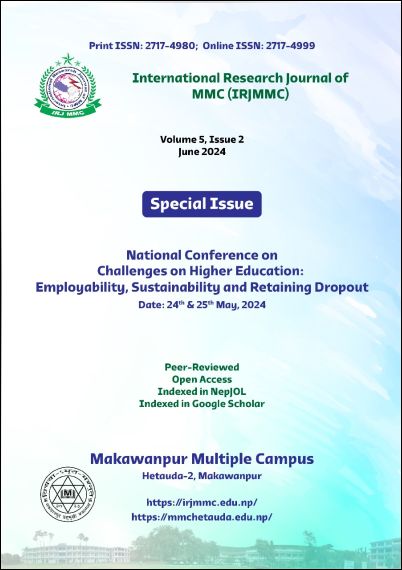Democratic Leadership and Job Satisfaction: Moderating Role of Age and Gender
DOI:
https://doi.org/10.3126/irjmmc.v5i2.67850Keywords:
Leadership Style, Democratic leadership, Job satisfaction, Simple regression model, Age, GenderAbstract
The job satisfaction level of employees in an organization is subject to alteration because of the leadership style of the managers. Different leadership styles can have different effects on the job satisfaction levels. This study attempts to provide a comprehensive understanding of the impact of democratic leadership on job satisfaction, along with the moderating role of age and gender in this impact, through an empirical investigation in Nepalese Commercial Banks where 5 out of the 10 highest profit-earning banks in the second quarter of FY 2079/80 were taken as samples for the study and questionnaires were distributed. It uses a multiple regression model, evaluates the dummy indicator regression of democratic leadership and job satisfaction, and discusses the findings of the analysis, which indicate that democratic leadership had a positive and significant impact on job satisfaction as the coefficient of multiple determination calculated is 0.433. The adoption of a democratic leadership style by the managers led to an increase in the job satisfaction levels of the employees because of the emphasis on participative behavior, motivation, and communication. Similarly, both age and gender played no significant moderating role in democratic leadership’s impact on job satisfaction as the adjusted R-square values are 0.402 for females, and 0.506 for males, gender-wise, and it is 0.823 for the age group (22-26) and 0.506 for 26 and above, age-wise. This paper concludes with the implication that a democratic leadership style should be adopted by the leaders to instill a participative environment and satisfy the employees. It also establishes the foundation for additional in-depth research in the future, in line with the limitations of this study.
Downloads
Downloads
Published
How to Cite
Issue
Section
License
Copyright (c) 2024 The Author(s)

This work is licensed under a Creative Commons Attribution-NonCommercial 4.0 International License.

